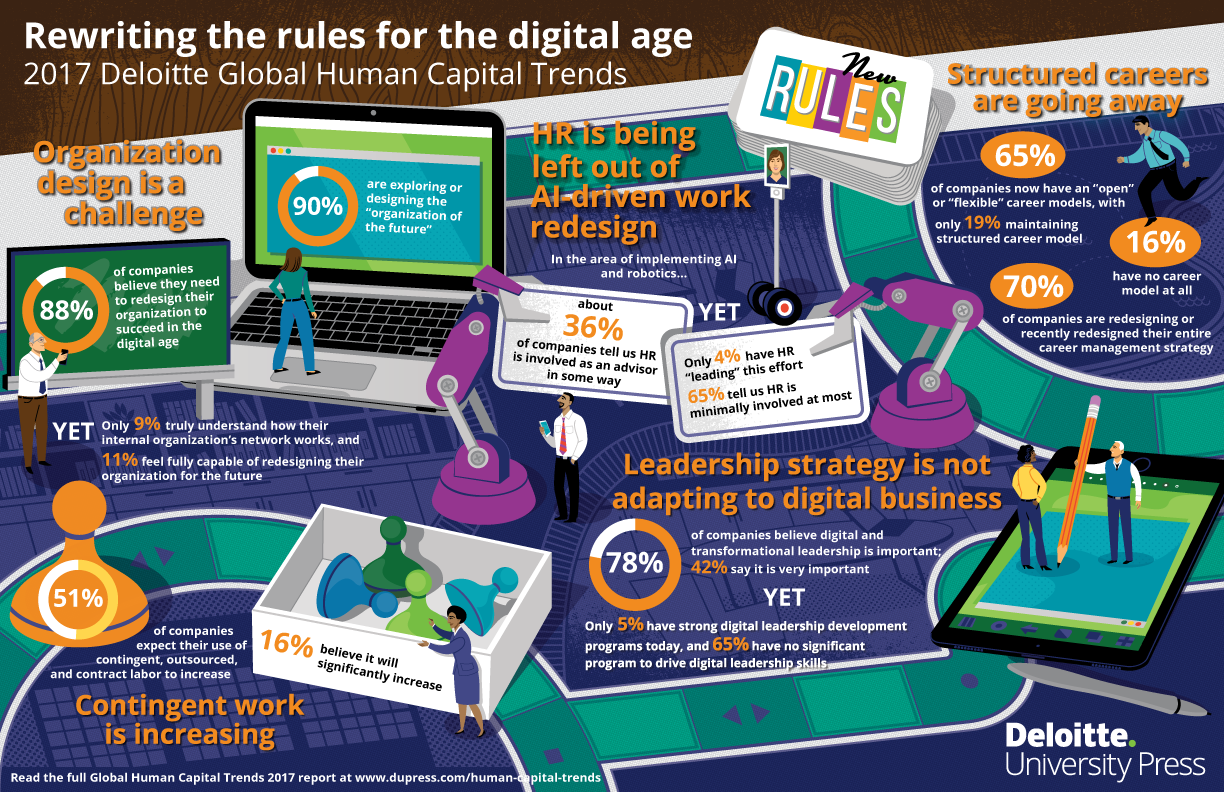 With so much research being produced in and around the area of organisational learning it can be hard to stay on top of what the new evidence is telling learning professionals. That’s why we look at latest research that you can use to develop your practice.
With so much research being produced in and around the area of organisational learning it can be hard to stay on top of what the new evidence is telling learning professionals. That’s why we look at latest research that you can use to develop your practice.
Global consulting firm Deloitte recently published its report, 2017 Deloitte Global Human Capital Trends, looking at human capital trends. Now in its third year, the report represents a significant piece of research with responses from more than 10,400 business and HR leaders from 140 countries.
The research shows that learning is the second most important trend, behind designing the organisation of the future and ahead of talent acquisition and employee experience. It moved up from fifth spot in 2016.
Interestingly, it is the design of the organisation of the future which has big implications for learning. The report authors say that organisations need to be designed for speed, agility and adaptability in order to succeed in today’s business environment.
"Learning is the second most important trend, behind designing the organisation of the future and ahead of talent acquisition and employee experience"
 To be adaptable, organisations need a new operating model, one that is networked and not hierarchical. Networks enable teams to work together - this is how work will get done.
To be adaptable, organisations need a new operating model, one that is networked and not hierarchical. Networks enable teams to work together - this is how work will get done.
The researchers say, “Top companies are built around systems that encourage teams and individuals to meet each other, share information transparently, and move from team to team depending on the issue to be addressed.”
This vision reflects Noddlepod’s reason for being - to support the collaboration and information sharing that fuels effective teamwork. The report says that 73% of organisations are now experimenting with tools to make collaboration easier.
The big shift in learning, as highlighted by the research, is away from careers and towards always on learning development opportunities for colleagues who could be working for 60 years. As working lives evolve so employers are looking to support colleagues so that they can continuously develop their knowledge and skills. The report authors say that the half life of skills is now five years. This is the reason employees will need to continuously adapt and develop their skills. Knowing a skill for five years is not going to set you up very well for a 60-year working life.
 The research shows that 90% of CEOs believe their company is facing disruptive change driven by digital technologies and 70% say their organisation does not have the skills to adapt.
The research shows that 90% of CEOs believe their company is facing disruptive change driven by digital technologies and 70% say their organisation does not have the skills to adapt.
This need to keep upskilling employees has sparked interest in new technologies that enable employees to curate content, consume video and mobile content and harness external content and resources. These new technologies are the fastest growing areas of HR technology.
So what does this mean for L&D teams? According to the report authors, L&D will become a more strategic function that focuses on innovation and leadership. It will deliver high-quality learning experiences, promote lifelong learning and bring together teams from across the organisation to connect and collaborate.
Connection and collaboration is a strong theme in this research. Now that digital tools are available to enable teams to work together, share information and collaborate it is up to organisations, and L&D in particular, to make it happen.
"L&D will become a more strategic function that focuses on innovation and leadership. It will deliver high-quality learning experiences, promote lifelong learning and bring together teams from across the organisation to connect and collaborate."
Tips:
Embrace the speed of change
Digital makes us more connected so understand how your organisation can benefit from better connected colleagues.
Refocus the L&D team
Move away from training delivery and focus on curation, culture and bringing people together.
 Pick and mix tools according to central needs
Pick and mix tools according to central needs
There are some amazing digital tools available out there, including specialist, low cost competitors to the traditional one-stop-show LMSs.
Focus on the user, uncover the real needs and consider a "best of breed" approach shopping for learning systems.
Previous research round-ups and related posts
Transforming Formal Learning summarising the Towards Maturity report, which can be accessed in full here.
Why classroom facilitators play a critical role in digital innovation by Towards Maturity.
Shopping for learning systems - shifting from 'one stop shop' to best of breed an article published on Trainingzone.com.